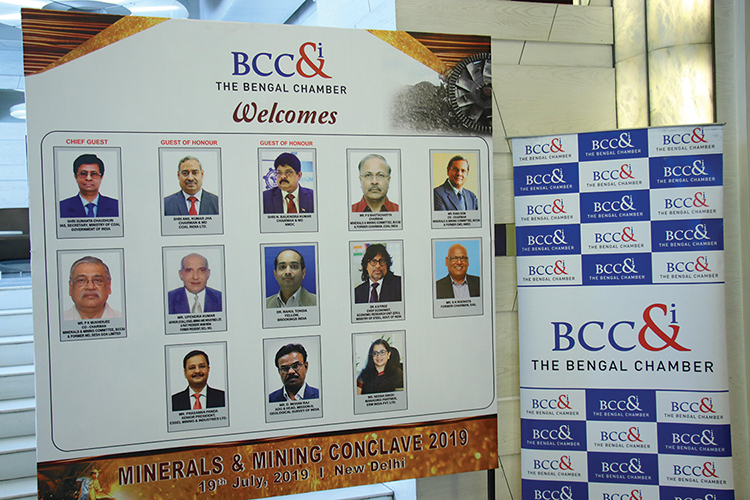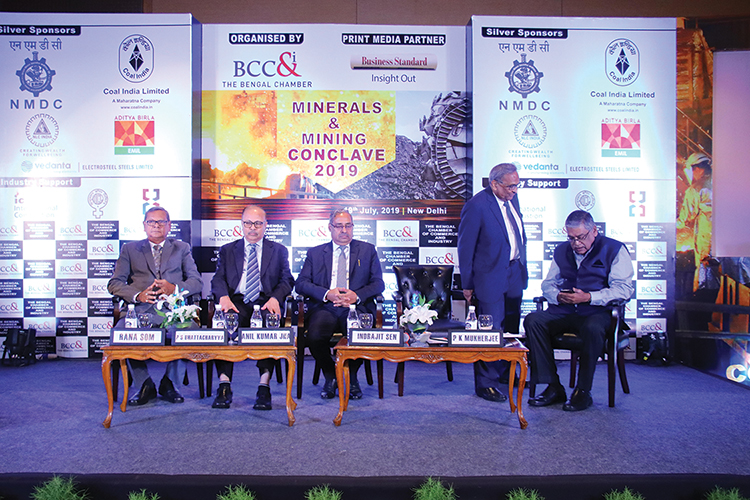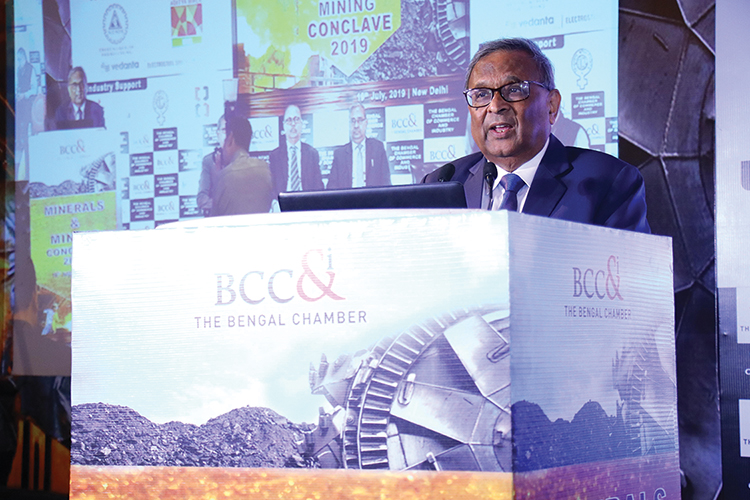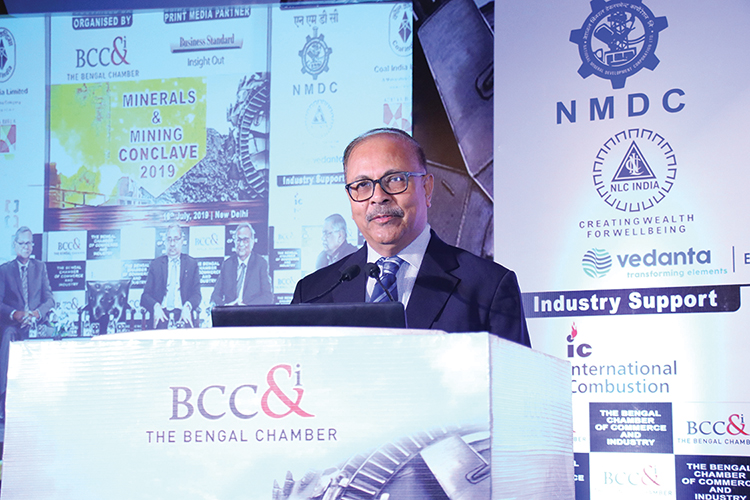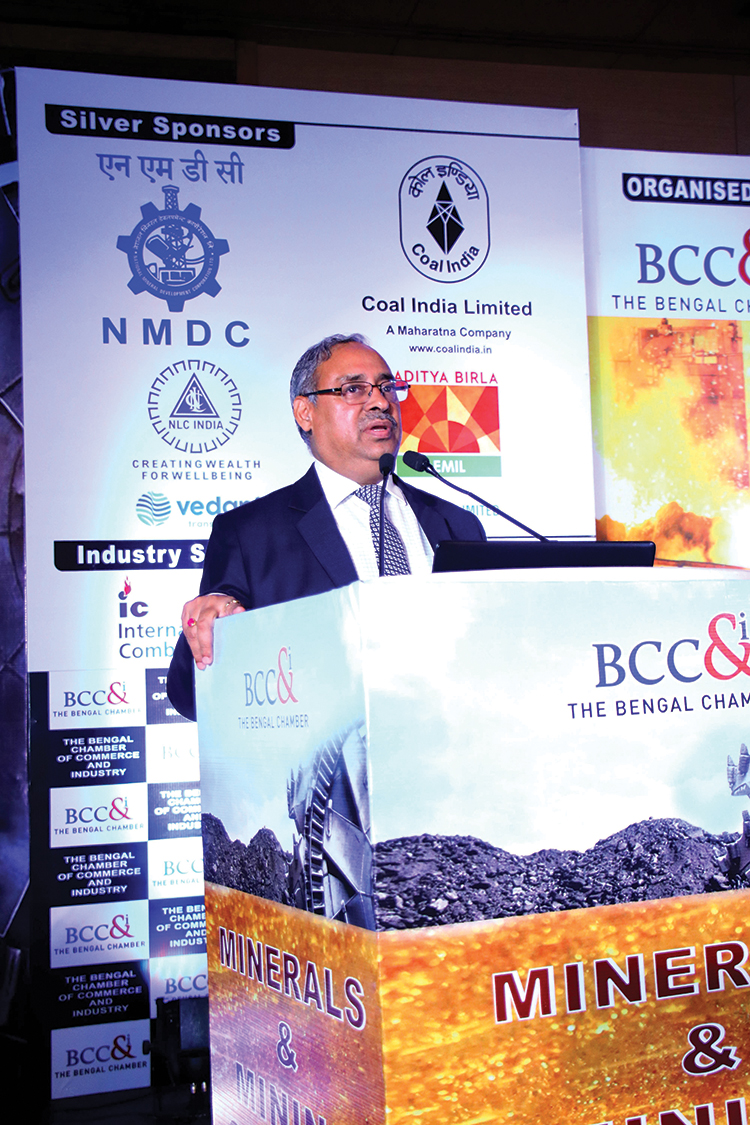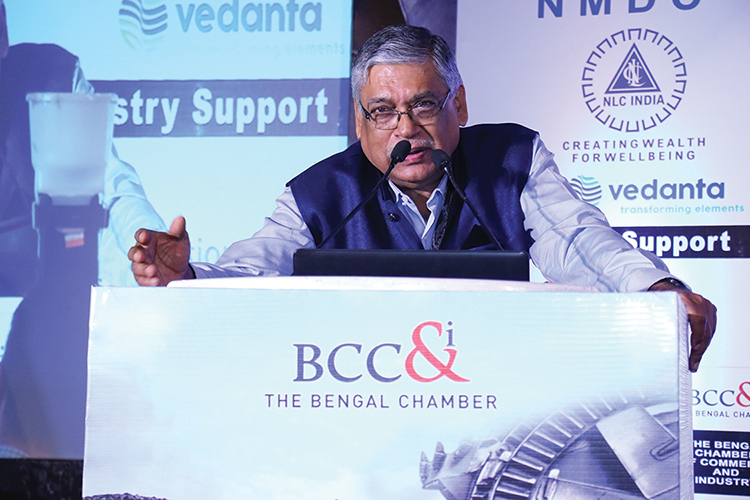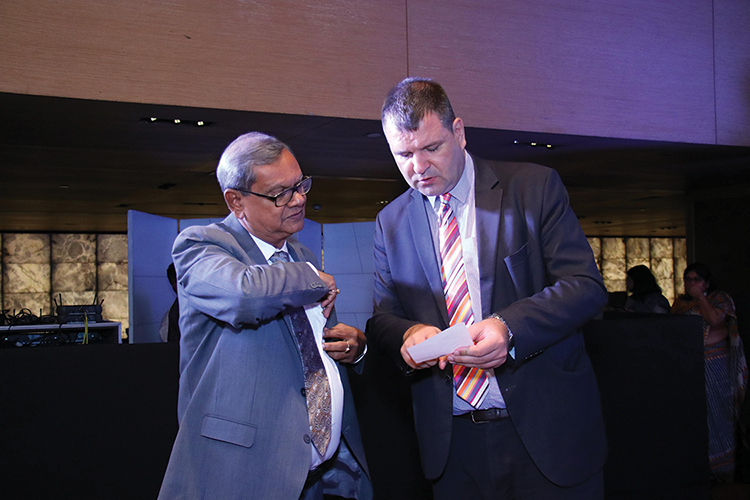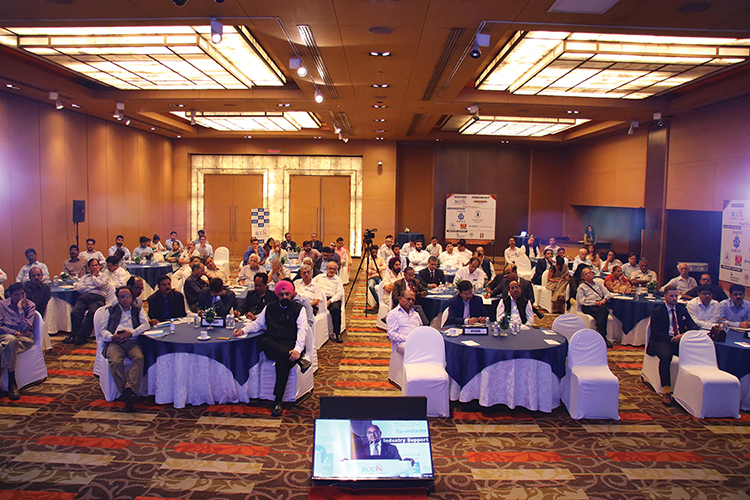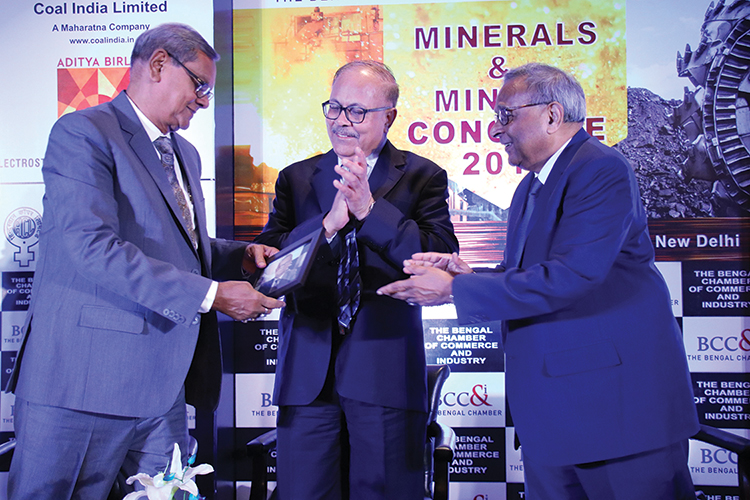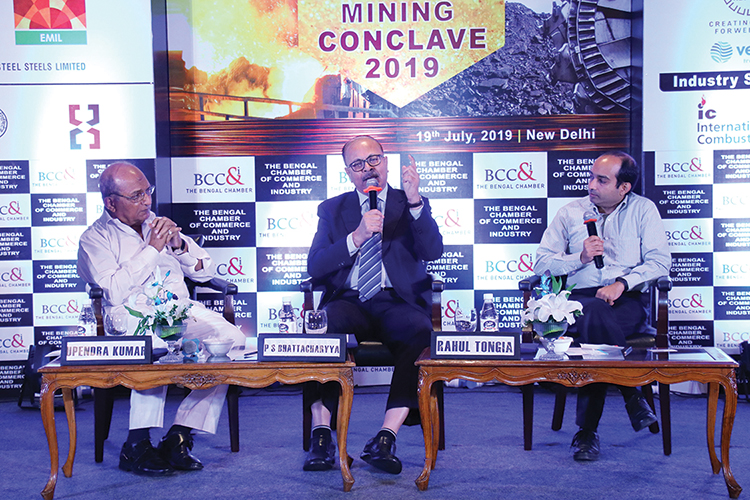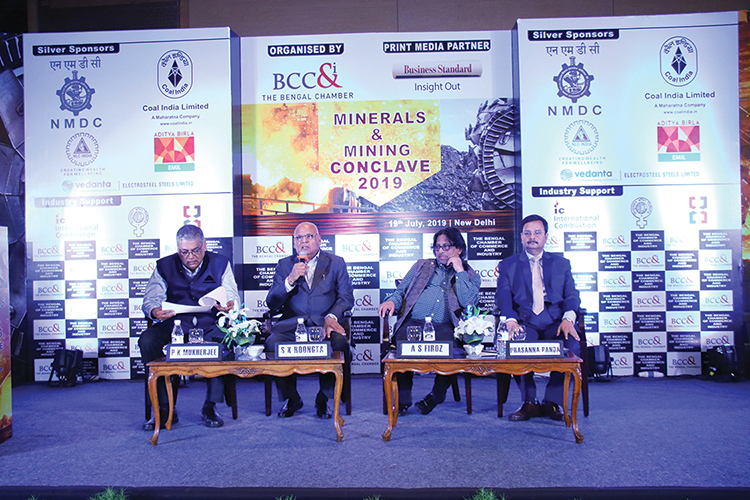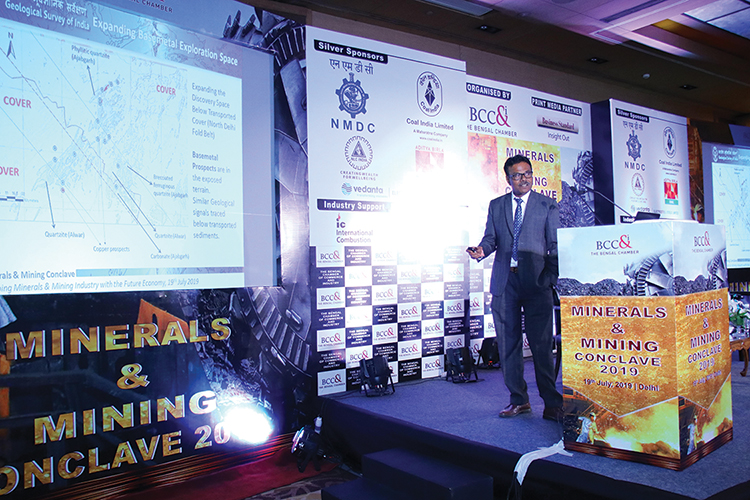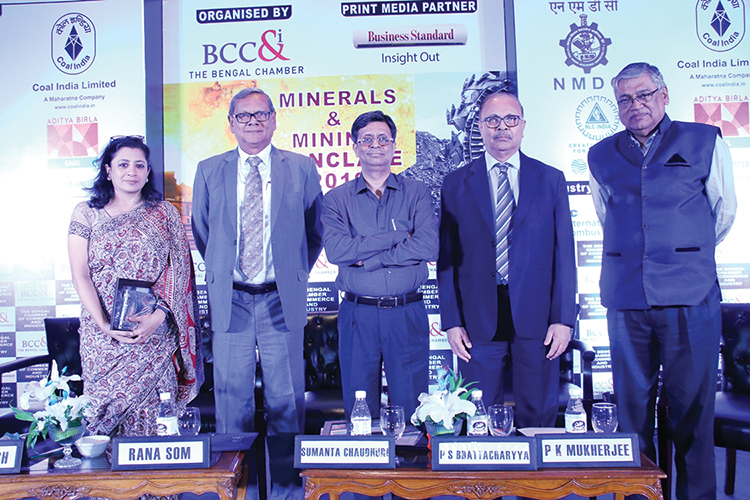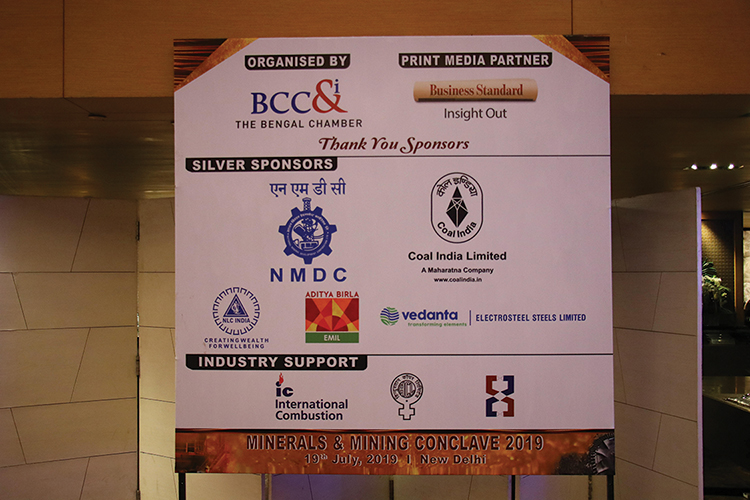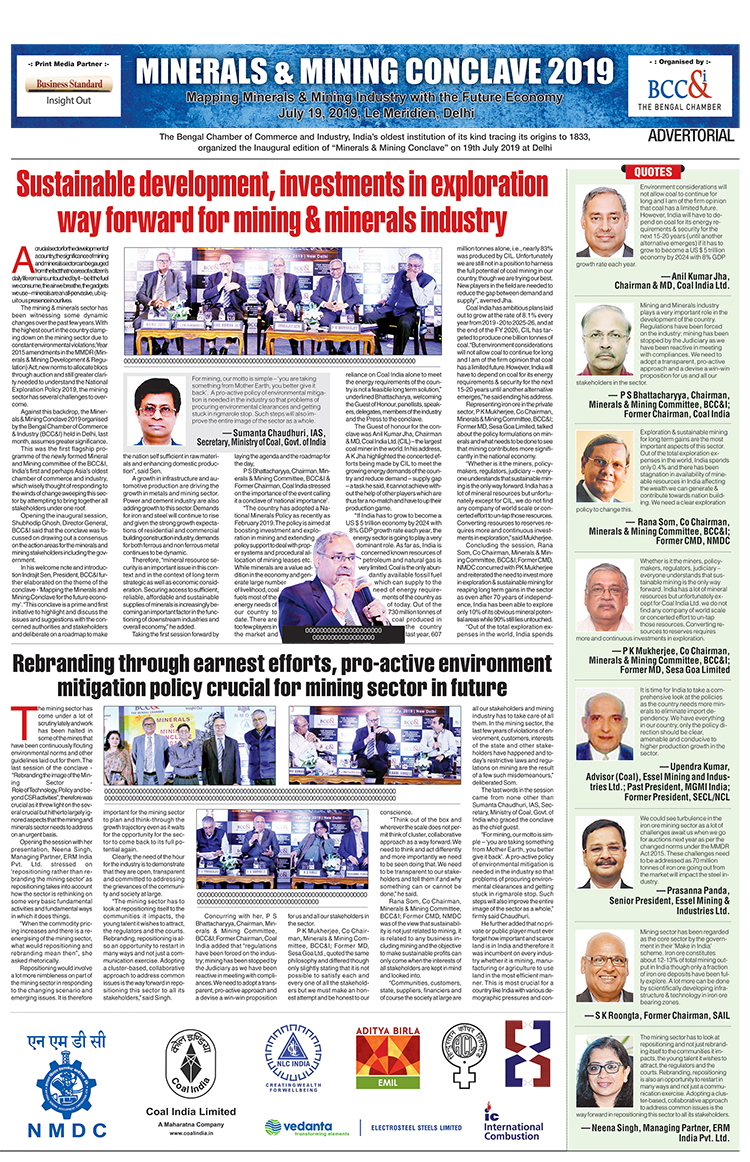Following a paradigm change in the mineral sector post the
MMDR Amendment Act, 2015, The Chamber responded pro- actively to the dynamic changes that have been
taking place in the sector. The Minerals & Mining Conclave, themed as "Mapping Minerals & Mining
Industry with the Future Economy", organised by The Bengal Chamber of Commerce
& Industry on 19th July 2019, in Delhi, has set a new momentum and have been hugely successful in
spreading awareness about the great economic potential in the mining and minerals sector.
Considering the importance of this sector, the 'Bengal Chamber Committee on Minerals & Mining' was
formed recently, led by Mr. P S Bhattacharyya, Chairman, Minerals & Mining Committee and Former
Chairman, Coal India; Mr. P K Mukherjee, Co-Chair and Former MD, Sesa Goa Limited and Mr. Rana Som,
Co-Chair, and Former CMD, NMDC to address the key concerns through industry experts and
recommending the findings to the appropriate levels of relevant governments. This Conclave is the
prime and first initiative to highlight and discuss the issues & suggestions with all the concerned
authorities and stakeholders and deliberate on a roadmap to make the nation self-sufficient in
raw-materials and enhancing domestic production..
India produces 95 minerals- 4 fuel-related minerals, 10 metallic
minerals, 23 non-metallic minerals, 3 atomic minerals and 55 minor minerals (including building and
other minerals).Rise in infrastructure development and automotive production are driving growth in
the sector. Power and cement industries are also aiding growth in the metals and mining sector.
Demand for iron and steel is set to continue, given the strong growth expectations for the
residential and commercial building industry. India is the 3rd largest producer of coal. Coal
production in the country stood at 688.8 million tonnes in FY18. India ranks 4th in terms of iron
ore production globally. In FY18, production of iron ore stood at 210 million tonnes. India has
around 8 per cent of world's deposits of iron ore. India became the world's second largest crude
steel producer in 2018 with an output of 106.5 million tonnes. According to Ministry of Mines,
India has the 7th largest bauxite reserves-
-- around 2,908.85 million tonnes in FY17. Aluminium production stood at 0.92 million metric tonnes
during Apr- June 2018 and is forecasted to grow to 3.33 million tonnes in FY20. There is a
significant scope for new mining capacities in iron ore, bauxite and coal and considerable
opportunities for future discoveries of sub-surface deposits. Infrastructure projects continue to
provide lucrative business opportunities for steel, zinc and aluminium producers. Aluminium
production is forecasted to grow to 3.33 million metric tonnes by FY20. Iron and steel make up a
core component of the real estate sector. Demand for these metals is set to continue given strong
growth expectations for the residential and commercial
building industry. Mineral resources security is an important
issue with strategic as well as economic significance. Securing access to sufficient, reliable,
affordable, and sustainable supplies of minerals is increasingly becoming an important factor for
functioning of downstream industries and the overall economy. It is imperative that the exploration
is carried out systematically, scientifically and intensively over the entire geologically
conducive mineral bearing area of the country, using state-of-the-art technologies in a time bound
manner. The challenges that the mining and metals sector faces are not occurring within an industry
vacuum. They are taking place in the context of - and to some extent being driven by
- the broader technological and economic upheaval brought about by rapid and disruptive digital
innovations across industries. As with historical upheavals, technology has hastened the spread of
ideas. The major difference between disruption today and in the past is the accelerating pace and
pervasiveness of change. Particular attention must be given to exploration of minerals in which the
country has a poor resource-cum-reserve base for which the country is mainly dependent on imports.
The Conclave thus provided a perspective on the challenges, increasing the production of mineral,
sustainable mining and also innovations in mining to address the downbeat image of mining industry..
Through its various sessions the Conclave focused on : "Indian Coal Industry- Mapping the Future
Demand", "Iron ore mining in India: The road ahead", "Non Ferrous, Precious & Rare Earth Metals
Mining: The unexplored zone" and "Rebranding the image of the Mining Sector- Role of Technology,
Policy and beyond CSR Activities".
The Conclave witnessed the presence of Mr. Anil Kumar Jha, Chairman & MD, Coal India Ltd. and Shri
Sumanta Chaudhuri, IAS, Secretary, Ministry of Coal, Government of India who was the Chief Guest of
the Conclave. Some of the other Key speakers of the Conclave were Dr. A S Firoz, Chief Economist,
Economic Research Unit (ERU), Ministry of Steel, Govt. of India, Mr. S K Roongta, Former Chairman,
SAIL, Mr. Prasanna Panda, Senior President, Essel Mining & Industries Ltd., Mr.
D. Mohan Raj, ADG & Head, Mission-II, Geological Survey of India, Ms. Neena Singh, Managing
Partner, ERM India Pvt. Ltd. and Dr. Rahul Tongia, Fellow, Brookings India..
The conclave was attended by 140 - 150 participants from across mining companies, steel products &
steel alloys producing companies, Engineering Industry, Mining Equipment
& Machinery producing companies, Sponge Iron Manufacturers, Mineral Trading Companies, Institutes
with Department of Geology, Geo-Spatial companies, Consultants and also Engineers. The
participation included big corporate as well as small & medium companies to individuals like
faculties, Engineers, Designers & consultants.
PROGRAMMES
-
Annual General Meeting 2018
Annual General Meeting 2018
- The Bengal Chamber Annual General Meeting 2018, 12th September 2018, The Bengal Chamber Premises (Annual Reception in the Evening at the Hyatt Regency).View Details
-
Agro and Rural Development
AGRO AND RURAL DEVELOPMENT
- BCC&I Rural Connect 2018, 3rd & 4th December, 2018, Biswa Bangla Convention Centre, Rajarhat.View Details
- Dr. Meghnad Saha Memorial Lecture, 12th February, 2019, Ramakrishna Mission Institute of Culture, Golpark. View Details
- Annual Endowment Lecture, 20th February, 2019, Chamber Premises.View Details
-
Economic Affairs
Economic Affairs
- Interactive Session on Current Economic Realities, 10th October, 2018, Bengal Lounge. View Details
- BCC&I India Economic Conclave, 14th December, 2018, Chamber Premises.View Details
- Interim Union Budget 2019-20 Viewing Session, 1st February, 2019, Chamber Premises.View Details
- State Budget Viewing Session, 4th February, 2019, Chamber Premises.View Details
- The Union Budget 2019-20 Viewing Session, 5th July, 2019, Chamber Premises.View Details
- The Post-Budget Analysis Session ‘Union Budget 2019-20: An In-Depth Analysis’, 6th July, 2019, The Park, Kolkata.View Details
-
Education
Education
- BCC&I Annual Education Conference 2019, “21st Century Realities & Learning – Creating More Polymaths”, 3rd May, 2019, Hyatt Regency, Kolkata.View Details
- Conference on Early Childhood organized by The Bengal Chamber of Commerce and Early Childhood Association, 13th Jul, 2019, Chamber Premises.View Details
-
Entrepreneurship Development
Entrepreneurship Development
- Domain Name Roundtable Workshop, 29th September, 2018, Ranchi. View Details
- Entrepreneurs' Business Summit, 16th November, 2018, Williamson Magor Hall, The Chamber Premises, Kolkata.View Details
- ‘The Rising Foodpreneurs’, 16th February, 2019, Chamber PremisesView Details
- ‘An Interaction on IP Creation – A Business Breakthrough’, 10th June, 2019, Hotel De Sovrani, Kolkata. View Details
- ‘An Insight into Funding for Startups & MSMEs’, 1st July, 2019, Hotel De Sovrani, Kolkata.View Details
-
Energy and Environment
Energy and Environment
- World Sustainable Development Summit (WSDS) 2019, Kolkata Regional Dialogue on ‘Preparing for the Future of Urban Mobility’, 4th October, 2018, The Bengal Chamber PremisesView Details
- Discussion Forum on Ecological Sustainability in the Industrial Region, 30th November, 2018, The Golden Retreat, Haldia. View Details
- ‘Future Ready Cities – An Experience Sharing with Norway’, 17th December, 2018, Hyatt Regency, Kolkata.View Details
- Workshop on “Strategic Vision for Emission Control ”, 5th February, 2019, Chamber Premises. View Details
- Interactive Session on Clean Energy and Transport Choices and their effects on Air Quality”, 1st March, 2019, Chamber Premises.View Details
- Round Table Discussion on “Sustainabilty as Strategy in Business”, 8th May, 2019, Chamber Premises.View Details
- Sustainability Dialogue for North Bengal, 29th May, 2019, Hotel Sinclairs, Siliguri.View Details
- Powered by Tech, 2nd August 2019, Le Meridian, New DelhiView Details
- 12th Edition of Bengal Chamber, Environment and Energy Conclave, 29th August 2019, ITC Sonar, Kolkata View Details
-
Exhibitions and Trade Fairs
Exhibitions and Trade Fairs
- India International Siliguri Trade Fair 2018, 28th September, 2018, Siliguri.View Details
- 17th India International Mega Trade Fair Kolkata 2018, 14th – 25th December, 2018, Science City Grounds, Kolkata.View Details
- India International Mega Trade Fair 2019, 25th January – 4th February 2019, Bhubaneswar.View Details
- India International Mega Trade Fair 2019, 15th – 25th February, 2019, Vishakhapatnam.View Details
-
Health
Health
- A Musical Evening by Pandit Bickram Ghosh and Shri Amaan Ali Bangash on the Occasion Awareness on “Deceased Donor Programme – Cadaver Daan”, 8th December, 2018, Tollygunge Club, Kolkata. View Details
- The Sunfeast Farmlite 10th Health & Lifestyle Quiz, 4th July, 2019, Chamber Premises.View Details
-
HR / IR
HR / IR
- ‘Next Gen Employability Industry-Academia Networking Meet, 19th January, 2019, Hotel The Citi Residency, Durgapur.View Details
- BCC&I Secretariat Visit to Bangladesh, 23rd April – 26th April, 2019, Dhaka, Bangladesh.View Details
- ‘The People Management Conclave – 2nd Edition – Achieving Business Competence through Capability Building’, 5th July, 2019, Hotel Novotel, Rajarhat, Kolkata.View Details
-
Information Technology
Information Technology
- “Cyber Terrorism and the Economy – A Gathering Storm”, 16th January, 2019, The Lalit Great Eastern, Kolkata. View Details
- The Bengal Chamber Technology Quiz - Inter-College Quiz Fest, 30th March 2019, Guru Nanak College Campus, Sodepur. View Details
- Health Tech 2019, 12th -13th April, 2019, The Taj Gateway, Kolkata.View Details
- Evaluation and Selection of Shortlisted Incubates, 10th, 11th, and 13th June, 2019, WEBEL-BCC&I Tech Incubation Centre.View Details
- 10th Edition of the Business IT Conclave (BITC), 20th June, 2019, Hyatt Regency, Kolkata.View Details
-
International Relations
International Relations
- Interactive Session with Her Excellency Melba Pria, Ambassador of Mexico in India, 7th September, 2018, Chamber Premises. View Details
- Interactive Session with the Australian Deputy High Commissioner Mr. Rod Hilton on ‘An India Economic Strategy to 2035: Navigating from Potential to Delivery’, 20th September, 2018, Chamber Premises.View Details
- Interactive Session with H.E. Brigitte-Walchshofer, Ambassador of Austria to India, Austrian Embassy, New Delhi, 3rd October, 2018, Chamber Premises.View Details
- Cocktails and Conversation on “The Future Mobility in Kolkata”, 1st November, 2018, The Bengal Club.View Details
- Awareness Generation and Capacity Building Workshop on BBIN – MVA, 12th December, 2018, Kalpana Inn, Durgapur, West Bengal.View Details
- B2B Meeting with the Delegation of the Chittagong Chamber of Commerce and Industry, 30th January, 2019, Chamber Premises.View Details
- Japan Country Session at Bengal Global Business Summit (BGBS) 2019, 7th February, 2019, Biswa Bangla Convention Centre, Kolkata.View Details
- Meeting with dignitaries from EU Delegation to India and European Investment Bank, 21st February, 2019, Chamber Premises.View Details
- Meeting with Belgian Embassy Representatives, 14th March, 2019, Chamber Premises.View Details
- Meeting with Mr. Steven Liu, Director, Taipei World Trade Center, Liaison Office in Kolkata, 20th March, 2019, Chamber Premises.View Details
- Meeting with the officials of UK Government to discuss industry sectors where Bengal can draw more FDI, 26th March 2019, Chamber Premises.View Details
- Meeting with Mr. Matt Ingeneri, Economic Growth Unit Chief, Embassy of the United States of America (New Delhi), 11th April 2019, Chamber Premises.View Details
- Taiwan Delegation, 12th April, 2019, Kolkata .View Details
- Interactive Session on Doing Business with Hong Kong and Mainland China, 7th May, 2019, Chamber Premises.View Details
- Interactive Session with Trade Winds Business Delegation & Ms. Patricia Hoffman, United States Consul General in Kolkata, 9th May 2019, Chamber Premises.View Details
- Special Session with Mr. K V Kumar, Founding Chairman, Indian American International Chamber of Commerce (IAICC), 20th May, 2019, Chamber Premises.View Details
- An Interactive Session and B2B discussion with Dutch Delegation Focusing on Waterways Infrastructure Development, 14th June, 2019, Chamber Premises.View Details
- BCC&I Business Delegation to Germany, 24th June – 28th June, 2019.View Details
- Interactive Session with Mr. Robert Chatterton Dickson, British High Commissioner to Bangladesh, 25th July 2019, Chamber PremisesView Details
- Interactive Session with Mr. Rahul Tabhane, Country Head-India, UK Export Finance, British Deputy High Commission, Mumbai, 25th July 2019, Chamber PremisesView Details
- Interactive Session with Ambassador of Japan to India H.E Mr. Kenji Hiramatsu,10th August 2019 , The Bengal Lounge, Chamber PremisesView Details
-
International Trade Cell
International Trade Cell
- Workshop on Future of International Trade 2018 – 2019, & New Initiatives, 18th December, 2018, Chamber Premises.View Details
- International Trade Conclave – “India’s International Trade Growth Story within the Emerging Markets”, 1st March, 2019, Chamber Premises. View Details
-
Leadership Lecture Series
Leadership Lecture Series
- BCC&I Leadership Lecture with Mr. Sourav Ganguly, 14th December, 2018, Chamber Premises.View Details
-
Legal
Legal
- Round-Table Discussion on “Mediation – A Business Friendly Alternative for Dispute Resolution”, 7th June, 2019, Chamber Premises.View Details
- Awareness Seminar Mediation – A Cost Effective Option for Resolution of Disputes for SMEs [A collaborative effort of The Bengal Chamber & Bombay Chamber], 20th August 2019, Chamber premises, KolkataView Details
-
Marketing and Brand
Marketing and Brand
- 10th Edition of the BCC&I Marketing and Brand Conclave, “The Millennial Consumer and Future CMOs”, 23rd August 2019, ITC Sonar, KolkataView Details
-
Metals & Mining
Metals & Mining
- Metals Conclave 2019, Indian Metals Industry: Vision 2030, 28th May, 2019, The Park, Kolkata.View Details
- BCC&I Minerals & Mining Conclave 2019 -“Mapping Minerals & Mining Industry with the Future Economy“, 19th July 2019, Le Meridien, DelhiView Details
-
MSME Development, Manufacturing and Allied Activities
MSME Development, Manufacturing and Allied Activities
- Inauguration of The Bengal Chamber Centre of Excellence for MSMEs, 19th December, 2018, Chamber Premises.View Details
- Industrial visit to Durgapur, 12th January, 2019, IMERYS Steel Castings India (formerly Stollberg India Pvt Ltd).View Details
- Annual Manufacturing and MSME Conclave on “Long Term Approach towards Quality Manufacturing with MSME Focus” and Annual MSME Awards, 22nd – 23rd February, 2019, Chamber Premises.View Details
- “Neo MSME Summit – 2030: An MSME Odyssey”, 7th June, 2019, HHI, Kolkata.View Details
- Annual Workshop on Lean Management – The Key to Success, 5th to 6th July, 2019, Chamber Premises.View Details
-
Skill Development
Skill Development
- Eastern India Regional CXO Meet 2019 by Paschim Banga Society for Skill Development under Department of Technical Education, Training and Skill, Government of West Bengal along with The Bengal Chamber of Commerce and Industry as the Chamber partner, 26th July 2019, Biswa Bangla Convention Centre, RajarhatView Details
-
Shipping
Shipping
- BCC&I Annual Shipping Conclave on “Logistics in India – The Way Ahead”, 7th December, 2018, Chamber PremisesView Details
- Annual Shipping Workshop on Shipping Laws for Present Day Managers, 27th July 2019, Chamber Premises View Details
- Launch of Shipping Portal by Marine container Services (India) Pvt. Ltd, 9th August 2019, Chamber PremisesView Details
-
Social and Cultural
Social and Cultural
- “Ek Ananya Shruti Sangeet Sandhya”, 10th November, 2018, Mahanayak Uttam Mancha, Kolkata.View Details
- Bangla Utsob, 4th – 6th January, 2019, Nazrul Manch, Kolkata.View Details
- Ratnagarbha, 2019, 8th March, 2019, The Lalit Great Eastern, Kolkata. View Details
- SHER in Association with the Bengal Chamber Presents Conversation on Conservation in Evening with Acclaimed Nature & Wildlife Photographer, Mr. Dhritiman Mukherjee, Presenting his Photographs, the Stories and Ethics behind them, 3rd July, 2019, Chamber Premises.View Details
-
Sports
Sports
- Kheladhula Adda : ICC World Cup 2019, 21st May, 2019, Chamber Premises. View Details
-
Taxation
Taxation
- Seminar on GST Return Filing, 5th October 2018, Chamber Premises.View Details
- Seminar on Contentious Issues related to GST, Recent Notification & Circulars, 15th February, 2019, Chamber Premises. View Details
- Crash Course for GST Practitioner (GSTP) Exam, 31st May, 1st June, 7th June & 8th June, 2019, Chamber Premises. View Details
- ‘Workshop on GST and its Impact on Exports’, 13th June, 2019, Fortune Park Pushpanjali, Durgapur.View Details
-
Talk Series
Talk Series
- “Undaunted” – Saving the Idea of India : book launch, 14th March, 2019, Chamber Premises.View Details
-
Think Series
Think Series
- BCC&I “Think Lecture Series with R. Ramakrishnan, 19th November, 2018, The Bengal Lounge, The Bengal Chamber Premises.View Details
- BCC&I Think lecture and book launch "When Coal Turned Gold" authored by Shri Partha S Bhattacharyya, Former Chairman, Coal India, 18th April, 2019, Chamber Premises.View Details
-
Tourism
Tourism
- A Tale of Two Festive Cities, “An Adda on Durga Puja in London and Kolkata”, 28th September, 2018, British Club, Kolkata.View Details
- BengalWeekend.Com and Department of Tourism, Government of West Bengal presents “Weekend Wonders”, 16th – 18th November, 2018, Allen Park, Park Street, Kolkata. View Details
-
Women Empowerment
Women Empowerment
- The Bengal Fashion Heritage (TBFH) 2018, 22nd December, 2018, ITC Sonar, Kolkata.View Details
-
Other Programmes
Other Programmes
- Thought Leader Lecture Series 2018-2019, 5th October, 2018, The Bengal Lounge.View Details
- Interactive Session with Dr. Sanjeev Chopra, IAS, Additional Chief Secretary, Department of Industry, Commerce and Enterprises & Director General, Administrative Training Institute, Government of West Bengal, 4th December, 2018, Chamber Premises.View Details
- Talk on “Artificial Intelligence and Robotic – Applications in Healthcare and Manufacturing” by Dr. Arpan Pal, Chief Scientist and Research Area Head, Embedded Systems and Robotics, TCS Research and Innovation, Tata Consultancy Services at the Managing Committee Meeting, 4th February, 2019, Chamber Premises. View Details
- Interactive Session with Smt. Roshni Sen, IAS, Principal Secretary, Department of Technical & Skill Development, Government of West Bengal during the Chamber’s Managing Committee Meeting, 26th March, 2019, Chamber Premises.View Details
- The Chamber’s Managing Committee’s Interactive Session with Dr. Michael Feiner, Hon’ble Consul General, Consulate General of the Federal Republic of Germany, Kolkata, 17th May, 2019, Chamber Premises. View Details
- The Chamber’s Managing Committee’s Interactive Session with Mr. Andrew Ford, Hon’ble Consul General, Consulate General of Australia in Kolkata, 24th July 2019, Chamber PremisesView Details
- Commemoration of Prince Dwarakanath Tagore’s Two Hundred and Twenty Fifth Birth Anniversary, 3rd August 2019, Chamber PremisesView Details
- Press Clippings
-
Appendix
Appendix
- PRESIDENTS OF THE BENGAL CHAMBER OF COMMERCE AND INDUSTRYView Details

